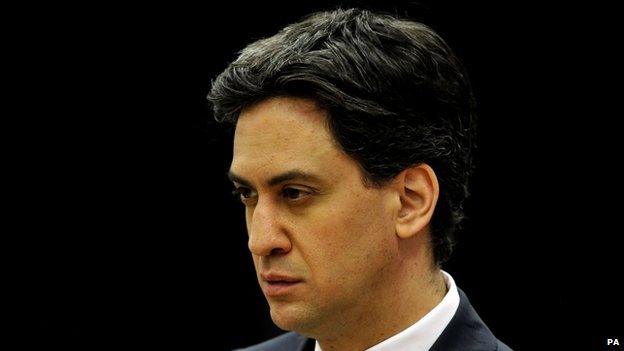Miliband's unorthodox strategy
- Published

Don't pick a fight with big business. Don't fall out with Murdoch. Don't look anti-aspiration. Those have long been considered the rules for anyone serious about winning an election.
What makes this campaign so unpredictable and so fascinating is that Ed Miliband is tearing up those rules. That's why he'll lose, say his critics. That's why he believes he'll stand on the steps of Number 10 in just 82 days' time.
The Labour leader believes that the great crash of 2007 changed the public mood for good. Victory, he believes, will go to whoever can surf the wave of public anger with the establishment - whether bankers, energy firms, media moguls or rich tax avoiders. The fact that five years ago he had this insight whilst his brother David did not is why Ed risked dividing his family to run for his party's leadership.
That's why the Labour leader seized on this week's revelations of mass tax avoidance at HSBC - using language designed to be incendiary at Prime Minister's Questions. David Cameron was "a dodgy prime minister surrounded by dodgy donors," he said. He was "up to his neck in this". They were "bang to rights".
He chose to overshadow the long-planned launch of his party's education policies by repeating his attack on the Conservative Party's ex-Treasurer Lord Fink for tax avoidance, describing Fink's admission that he'd engaged in "ordinary… vanilla" efforts to cut his tax bill as a defining moment.
'On your side'
It is hard for any leader of the opposition to make the political weather. Harder still for a man who the press and large parts of the public have written off as a potential prime minister. He is now less popular in Scotland than an English Tory old Etonian. That's why Labour have searched for moments when their leader can be seen to be speaking up for the public by standing up to the rich and the powerful.
Look at the polls and you'll see there is strategic method in what some see as electoral madness. Last May a Populus poll for the FT revealed that almost two-thirds of voters wanted the next government to be tougher with big business. Those demanding action included 50% of Tory supporters, 63% of Liberal Democrats, 67% of UKIP backers and 72% of Labour supporters.

Banking giant HSBC faces allegations it helped wealthy clients avoid or evade tax
Another poll by ComRes for ITV, external - taken before this week's HSBC's revelations but after Ed Miliband's row with the boss of Boots - suggested nearly half of voters thought Mr Miliband was on the side of the ordinary person.
That phrase "on your side" is one of the most potent in politics. It is arguably why Barack Obama won a second term as President despite having very poor personal ratings and despite widespread pessimism about the state of the US economy. He portrayed his opponent Mitt Romney as on the side of the rich - helped admittedly by Romney's extraordinary behaviour. He once bet another candidate in a debate $10,000 and when asked whether he liked football replied that "two of my friends own teams".
This is why I was so interested this week to learn that Ed Miliband's aides saw this week as comparable with the moment he chose to take on Rupert Murdoch over phone hacking. That was the week public disinterest in phone hacking was transformed into widespread revulsion after the revelation (since disputed) that the murdered teenager Milly Dowler's phone had been hacked.
Public concern
I reported here and elsewhere that the Labour leader's aides saw this as another Milly Dowler moment. The phrase was seized on by Labour's enemies in the press and by Tory HQ to suggest that Ed Miliband or his spin doctor were exploiting the memory of a murdered child. At no time did I or anyone else at the BBC make any such a claim. I did not directly quote anyone using the phrase "Milly Dowler moment" and won't of course reveal my source.
However, it's interesting to note that a Labour Party spokesman, quoted in The Times newspaper, external, has admitted to comparing the party's battle with Lord Fink with the way in which the story about Milly Dowler "crystallised" public concern over phone hacking.
He was quoted as telling the paper that the comparison between this week's story on tax avoidance and the story of the hacking of Milly Dowler's phone was "not a comparison of scale, not a comparison of substance, but a comparison of how certain stories help crystallise in people's minds what they already know to be true. People knew that there was something wrong with the way sections of the press were operating for a long time, but the revelation that Milly Dowler's phone had been hacked crystallised that. In a smaller way — in a very different kind of story, in a very different context — the tax avoidance story has crystallised something that people have known for a long time. There is something very wrong with the way the tax avoidance industry works."
Allies of Ed Miliband say that all this goes to show how scared of him his enemies are. Critics of his say it merely shows how badly wrong he's getting things.
Whoever's right it sure is interesting and it is unlikely to be the last time something the BBC reports becomes the subject of a political row.